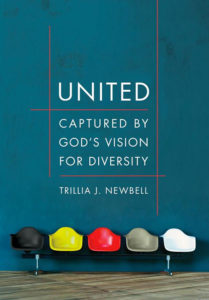How diversity reflects the kingdom of God
By Trillia Newbell
In the last 50 years, the term diversity has taken on many meanings. In the early 1960s, diversity most likely would have referred to the need for desegregation. By the ’70s and ’80s it would’ve been associated with affirmative action. Now diversity is often regarded as inclusivity in a myriad of ways.
The Bible, however, gives us a compelling vision for diversity in the kingdom of God. Diversity is already quite present in God’s kingdom, but we might miss it in Scripture if we aren’t looking for it. Here are four ways we can see a biblical basis for diversity and how it reflects the kingdom.
Creation: Image Bearers
We are all created in the image of God (Genesis 1:27). Not one of us was made apart from the creative, thoughtful design of our Creator God (Psalm 139:13-14). As image bearers, we were all made to reflect the Lord. So, if we are all created equally in the image of God, then as redeemed image bearers this is the first indication God’s kingdom is diverse.
We are created equally in His image. God doesn’t discriminate in His design—He doesn’t create one human being greater than the other. Because we are all image bearers, we can know God’s kingdom includes a variety of people groups—all ultimately created to reflect and worship Him.
Redemption: Gospel
We are all created in need of God’s saving grace regardless of the color of our skin. The Fall of Man affects us all, and we all fall short of the glory of God (Romans 3:23). The good news is Jesus died for every tribe, tongue, and nation. God loved the world and made it possible for anyone who believes to have eternal life. He made the way for all people (John 3:15-16). His mission was to seek and save the lost—everyone.
The Great Commission reminds us God’s mission is our mission: “Go, therefore, and make disciples of all nations, baptizing them in the name of the Father and of the Son and of the Holy Spirit, teaching them to observe everything I have commanded you” ( Matthew 28:19-20 emphasis mine).
Jesus commissioned His disciples to make more disciples of all nations. He didn’t say, “Go and find people who look and sound just like you.” He said they (and we) should seek to love and serve people from every nation.
Adoption: The Family of God
As Christians we are adopted children of God. Paul tells us of our new bloodline when he writes: “The Spirit himself testifies together with our spirit that we are God’s children, and if children, also heirs—heirs of God and co-heirs with Christ” (Romans 8:16–17). We are children of God and a fellow heir with Christ.
Even before His death, Jesus affirmed the importance of being a part of the family of God. Addressing the people while His mother and brothers stood outside, Jesus said, “‘Who is My mother and who are My brothers?’ And stretching out His hand toward His disciples, He said, ‘Here are My mother and My brothers! For whoever does the will of My Father in heaven, that person is My brother and sister and mother’” (Matthew 12:48–50).
Dig Deeper |
 |
| United: Captured by God’s Vision for Diversity by Trillia Newbell |
Jesus isn’t suggesting our biological families are no longer important (see Matthew 15:3). Rather, He is stating that following Him is far greater. He takes priority, and so does His kingdom—so much so that those who follow Him are counted as His brother and sister and mother—His family. The family of God, the kingdom of God, is colorful.
As we begin to view members of our churches as members of God’s family—and thus as members of our family—our prejudices begin to crumble. Understanding the family of God is yet another weapon against racial intolerance in the church and beyond. Only in the family of God can people so distinctly different be the same (equal in creation and redemption) and counted as sisters and brothers in a new family.
Revelation: Last days
Revelation records striking accounts of the last days when all nations, tribes, and tongues will be worshipping Jesus. Heaven won’t be filled with homogeneous people—except that we will all be glorified. What we won’t have in heaven is the sin that separates us from God and from each other.
We won’t fight against racism or wonder how to build diversity. We will be diverse. We will love completely and fully. We will worship together and enjoy one another for all eternity.
Creation, redemption, adoption, and revelation prove there is a diverse kingdom. Throughout all of Scripture, from Genesis to Revelation, we see God working to redeem a people for Himself, a people from every tribe and tongue and nation—colorful and diverse.
The church’s pursuit of diversity reflects the Bible’s description of the kingdom. We pursue diversity because the pages of Scripture are filled with it. Mostly we pursue diversity because the gospel embraces and advocates for a diversity of people to be born again into a new family for a holy and good God.
Trillia Newbell (@TrilliaNewbell) is author of United: Captured by God’s Vision for Diversity and consultant on Women’s Initiatives for the Ethics and Religious Liberty Commission.






